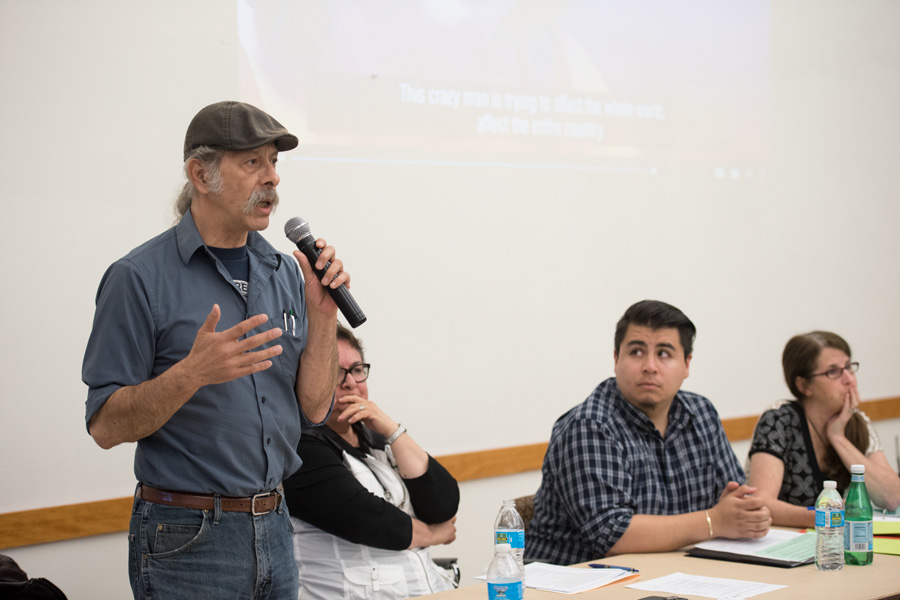Community activists stress immigrant rights as local issue
Katie Pach/Daily Senior Staffer
Jorge Mújica speaks on the panel. Mújica said that policies affecting immigrants are “pretty much exactly” the same as they were four years ago.
May 24, 2017
Community activists discussed how to assist Evanston’s immigrant and undocumented communities in a panel hosted by the Evanston Public Library and other community organizations Tuesday evening.
The four panelists spoke at the Levy Senior Center, 300 Dodge Ave., about the current political and legislative climate surrounding undocumented immigrants, immigrant rights and the social and emotional effects of immigration policy on immigrant families.
Miguel Ruiz, EPL’s Latino engagement librarian and an organizer of the event, emphasized that the safety and protection of undocumented immigrants is a local issue.
“Evanston has undocumented immigrants, and a lot of times they’re invisible to the community,” he said. “It’s important for us as community leaders and for the city of Evanston to have these conversations and empower these communities.”
Rachel Sollinger, an Evanston resident and community activist, said she has personally accompanied Evanston immigrant families to the post office so they could get passports. She said supporting the immigrant community and acting as an ally is important, as immigrant rights are an issue directly affecting members of the community.
Panelist Jorge Mújica, strategic campaigns officer for the community activism group ARISE Chicago, said policies affecting immigrants are “pretty much exactly” the same as they were four years ago.
He said President Donald Trump has “promised a lot of things” regarding immigration policy, but he has not followed through on those promises.
“(Trump) said that the construction of a border wall was going to start immediately — weeks went by and they couldn’t find the money,” Mújica said. “That wall is going nowhere.”
However, Mújica said, what has changed is how the topic is discussed. Mújica added that since the 2016 presidential election, there has been a “hate discourse” surrounding immigration.
At the panel, Luis Huerta-Silva, administrative relief regional trainer for the Illinois Coalition for Immigrant and Refugee Rights, spoke about immigrant rights and how direct service providers can protect immigrant and undocumented communities.
Huerta-Silva said he recommended that each business designate one person who is trained to handle situations such as an immigration officer or law enforcement official coming into a business asking for an individual.
He also spoke about the Illinois TRUST Act, a bill that would prevent state law enforcement agencies from aiding in immigration enforcement actions without a warrant. The bill was approved by the Illinois Senate on May 4.
“While the TRUST Act is very beneficial and would be a huge win for our communities, that’s not to say ICE will not continue its activity,” he said. “While Chicago has ‘sanctuary status,’ we cannot physically prevent (ICE) from continuing their actions.”
Dr. Virginia Quinonez, director of educational effectiveness at The Chicago School of Professional Psychology, spoke to the crowd about the difficulty of assimilating into a new country. She said it is important for direct service providers to establish an atmosphere of safety and trust with immigrants, particularly immigrant children.
“Many of these undocumented families live with a lot of fear,” she said. “For undocumented immigrants, and even for refugees, the migration process is very powerful in their lives.”
Email: [email protected]
Twitter: @sydstone16


